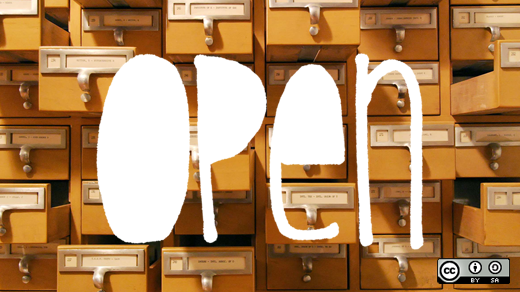As an open education supporter, I've been following the progress of FOLIO, a community effort built around the idea that "the future of libraries is open" (a phrase that also forms the group's acronym, FOLIO). FOLIO is a partnership between libraries and vendors that is developing an open source library services platform (LSP). FOLIO's platform is built on the idea that library management software should be flexible, modular, extensible, modern, and affordable, and it's gathered a number of partners and contributors to help make that vision a reality.
These partners have grown to include leading academic research libraries including the Open Library Environment (OLE) which is part of the Open Library Foundation, which also hosts the FOLIO project; library and research services provider EBSCO Information Services (EBSCO); library software and services providers including Index Data, Stacks, Qulto and @CULT; and library IT solutions and support provider ByWater Solutions.
To learn more about the initiative, with the help of FOLIO's Kathleen McEvoy, I asked the project's collaborators to share their insights on its purpose and future. Their answers are edited for length and clarity.
Why was FOLIO created?
Kathleen McEvoy, VP of Communications, EBSCO, FOLIO Spokesperson: We believe we can save libraries the money they now invest in the lengthy process of implementing an LSP—which can take years to fully implement. With FOLIO, we believe we are shifting the paradigm for libraries to manage content, regardless of the historical nature of print or the newer requirements of e-content, while creating a system that provides librarians with choice: apps and services created to prevent libraries from being locked into a monolithic system they had no involvement in creating.
If librarians can help create a platform that does what they need it to do, rather than spend time creating workarounds for current monolithic systems, we can create a true workflow that operates the library and helps the library expand its footprint within the academic institution.
Peter Murray, Open Source Community Advocate, Index Data: Open source in libraries has a long history. There is a natural alignment between the inclination of libraries to share books, journals, and knowledge that mirrors what happens in open source communities. FOLIO came together as a deliberate strategic investment by libraries, library organizations, and service providers. It seeks to leverage the dynamics of an open source community to drive innovation in library services and rejuvenate the relationship between libraries and service providers. We expect the result will be new business models for service providers, new ideas coming to the market faster and at lower risk, and more vibrant discussions between users of library software and creators of library software.
What is FOLIO's technology model?
Gar Sydnor, Senior VP, Resource Management and FOLIO Services, EBSCO: The FOLIO architecture is based on microservices, which is an easy and innovative method to quickly add new capabilities. Typical monolithic systems may be replaced every seven to 10 years. The process takes a long time and is very costly. With microservice architecture, there is no need to replace an entire system, rather apps and modules can be continually renewed and replaced.
Sebastian Hammer, Founder, Index Data: FOLIO is inspired by cloud technologies and by open-ended platforms such as smartphones and operating systems. It is essentially a web-based system for administering complex workflows in and between organizations, in which the individual work tasks are supported by "apps" on the platform.
The FOLIO platform provides shared facilities such as notifications, permissions, and task management, but the organization of the workflows is entirely up to the library, and the possible tasks that FOLIO can support depends on the apps that are installed. In this way, FOLIO can be extremely adaptable to the needs of individual libraries, and it can support libraries that seek to extend the services they provide beyond their traditional role.
What are the advantages of FOLIO's app-based platform?
Murray: Similar to how users have the freedom to choose from a variety of smartphone apps, libraries can choose which FOLIO apps to use. A library could continue to use its existing automation system (such as Koha or Evergreen) and make use of apps, such as electronic resource management. As long as the FOLIO RESTful API contracts are met, higher-level modules manipulating data from the proxy modules can successfully interact with legacy systems.
Hammer: The "app" model makes it considerably easier for individual developers or organizations to contribute to FOLIO since they only need to worry about the functionality of their own software, not the entire system. This model not only makes it possible for the FOLIO project to progress very rapidly, through the collaboration of many independent, loosely organized teams; it also inspires us to think about ways the FOLIO platform can be applied in entirely new areas. For instance, FOLIO team members are building apps to support research data management, and some medical libraries have even contemplated applying the platform to support certain clinical functions.
FOLIO supports "linked open data." What is that and what does it provide?
Eric Frierson, Senior Director of Field Engineering, North America, EBSCO: Linked data describes a method of publishing structured data so that it can be interlinked and become more useful. A linked open data repository allows us to build tools that can show users connections across traditional boundaries.
This is easier to demonstrate in an example: Imagine a results list from a library database—a list of articles. A researcher clicks on an article by a particular author. If the database creator also includes the ORCID (Open Researcher and Contributor ID), which is an open linked data system, the database user interface can send a call and pull back all that author's other writings. The database could then reliably show a list of "other works by this author." Further, those works might have other linked data elements, co-authors, etc. This information helps to show that this author publishes frequently on particular topics and collaborates with certain professors.
How is FOLIO different from existing open source library solutions, such as Koha or Evergreen?
Michael Winkler, Managing Director, Open Library Environment (OLE): FOLIO is a somewhat unique collaboration of commercial and non-commercial partners, working together with a vision for creating a shared infrastructure for sustained innovation in library services. Community-based systems like Koha and Evergreen are focused on providing open source versions of traditional library management systems and related integrations. FOLIO seeks to build an innovation platform that takes a more comprehensive view of library management, not just bibliographic control and license management.
Brendan Gallagher, CEO and Founder, ByWater Solutions: Any open source project (Koha or Evergreen) would not have to move to FOLIO to be part of the FOLIO project. Ideally, each project would invest in integrating the open source software they already love. Each project should concentrate on REST APIs that would work with FOLIO. Communication between the projects and software will only make a stronger platform. One of the core ideas of FOLIO is a RESTful messaging layer that will allow you to integrate many different applications.
Nathan Curulla, Owner/CRO, ByWater Solutions: FOLIO will be very much like Koha in many ways. The main difference is functionality as it pertains to electronic resources and the backend architecture that lends itself to a more "app-based" platform. [ByWater will also] create integration between FOLIO and Koha. Koha is the most used ILS on the planet and is supported by one of the largest and most vibrant communities in the library world. Creating a bridge between these two systems will help expand both the FOLIO and Koha communities and foster growth in markets already using business-critical open source software systems.
How will the partnership between ByWaterSolutions and EBSCO help the project grow?
Sydnor: Many vendors, services providers, consortia, and other organizations will be offering hosting and service support. Because FOLIO is an open source platform, libraries at smaller two- and four-year colleges, public libraries, and school libraries can take advantage of FOLIO and will not have to provide dedicated IT staff.
Curulla: With ByWater providing the technical means for smaller institutions to adopt FOLIO, a more diverse group of libraries will have access to this system and will be able to take full advantage of the functionality it contains without the need to hire additional staff at a higher cost than a support contract. For larger institutions with internal staff to support the project, ByWater will be able to take care of the minor, yet time consuming, issues that come up with FOLIO, as well as provide upgrade and other maintenance services, thus freeing up staff time to focus on more important projects, such as custom development initiatives and community building. This will result in more feature development coming from users, thus compounding the speed of growth for the project.
What can you tell me about the community supporting FOLIO?
Sydnor: The community represents a variety of libraries and organizations working with or for libraries as well as developers, subject matter experts, vendors/service providers, user experience (UX) experts, and advocates for issues including accessibility, localization, privacy, etc. The community grew out of the participation of vendors, services providers, and developers and operates under the Open Library Foundation.
FOLIO is the first project for the Open Library Foundation. The initial organizations within the FOLIO project included the Open Library Environment (OLE) libraries, Index Data, and EBSCO. The community has grown rapidly since the project's inception. More than 4,000 librarians, service providers, and developers are now following the project. Since January 2017, global FOLIO meetups—events that are hosted by libraries—have attracted more than 2,000 attendees. Today the project includes more than 70 developers, 200+ subject matter experts, and more than 10 vendors.
The community has set up an elaborate and entirely transparent infrastructure for managing development and community activities. Special interest groups (SIGs), which consist of subject matter experts, discuss system needs. The FOLIO product council then prioritizes the desired functionality before user interface (UI) designers translate these into UI elements. Product owners convert desired functionality into detailed requirements before handing off to developers. Meeting notes, schedules, group members, communications channels, and more are all available to those interested in the project and can be accessed via FOLIO website and the wiki.
Are there ways to get involved?
Sydnor: Opportunities exist to review the roadmap, ask questions, offer suggestions, receive updates, and suggest or join SIGs. This transparency allows individuals to track the project, receive updates, or get as involved as they'd like.
Hammer: Developers interested in learning more about the project can go to dev.folio.org. All source code and documentation are assigned to the Open Library Foundation, which holds the intellectual property on behalf of the community. Code is maintained in the folio-org organization on GitHub. The license used is version 2 of the Apache License, which has been chosen specifically to allow for the broadest possible engagement with the community and reuse of the software.







3 Comments